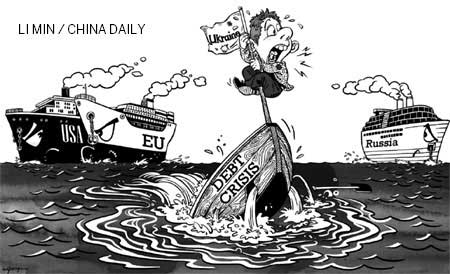
|
The Ukrainian crisis is quickly becoming a geostrategic conflict. The Crimean parliament's declaration of independence from Ukraine ahead of the March 16 referendum indicates Crimea may possibly join Russia. As Russian President Vladimir Putin maneuvers to restore Russia's right to behave with a superpower's impunity-particularly in its own backyard-the West pushes back. But economic forces also have shaped this confrontation, especially Ukraine's record as the world's worst performing industrial economy over the last 20 years. It was popular discontent with this disastrous performance that fomented the recent dissent. This, in turn, triggered a bloody response from ousted Crimean President Viktor Yanukovych. His response consolidated the opposition-and ultimately cost Yanukovych his job. Beyond this week's political and military maneuvers, the outstanding question is: Who will bail out the Ukrainian economy? Russia, or the EU and the United States? A bailout will be the price of drawing Ukraine into one of the two trading systems on offer. Stated simply, Ukraine is the economic equivalent of a failed state. After gaining independence in 1991, the country moved briefly to liberalize its economy along the same lines as most of Eastern and Central Europe. However, Ukraine soon jettisoned its reforms in favor of the state-oligarch model, which was also evolving in Russia. Some 20 years later, Ukraine's GDP has shrunk 30 percent. Even Russia's sorry economy is 20 percent larger than it was in 1991. And Poland's economy, which looked much like Ukraine's in 1991, has grown 130 percent over the same period. Ukraine's economic performance has been so terrible and for so long that its sovereign debt issues are now considered the equivalent of junk bonds. Even before the crisis, Ukraine's credit rating was worse than Greece's. And it was no better than that of Argentina, a global financial pariah for its mismanaged debt defaults and summary expropriations of foreign-owned companies. Ukraine's debts will soon be due, with some $15 billion in sovereign bonds maturing this year and another $15 billion in 2015. With a current account deficit equal to 8 percent of its GDP, Ukraine cannot pay off and refinance those debts without large-scale aid-$20 billion to $25 billion-and affiliating itself with a larger trading system. An economic and trade alliance with Russia would deliver the bailout, but with little prospects of improving the underlying economy. The European Union and the United States (through the International Monetary Fund) also are prepared to provide the bailout if the Ukrainian government accepts far-reaching economic reforms. The EU-US/IMF reforms should lead to better economic times down the road. But they also would mean more short-term hardships for ordinary Ukrainians. That's why Yanukovych sided with Putin. With a new, pro-Western government in charge in Kiev, Ukraine's fate may well lie in the hands of Europe and the United States. Their choice is simple to state, if difficult to execute: Do they put sufficient economic and diplomatic pressure on Putin, to convince him to pocket his own bailout-and let the West pick up the pieces? The author is co-founder and chairman of Sonecon, LLC, a private company that advises US and foreign businesses, governments and non-profit organizations. By Robert J.Shapiro ( China Daily) |
乌克兰危机正迅速成为一个地缘战略冲突。克里米亚脱离乌克兰的独立宣言是要表明克里米亚真有可能入俄。俄罗斯总统弗拉基米尔·普京竭力恢复俄罗斯超级大国免责权——尤其在自家后院——西方国家则迎头反击。 乌克兰的经济状况也引发了这一冲突,乌克兰过去20年沦为世界上最落后的工业化国家。 正是民众对经济糟糕状况的不满激起了最近这场抗议活动。反过来,这又引发时任总统维克多·亚努科维奇的残酷镇压,反对派于是众志成城最终把亚努科维奇赶下了台。 除了经济军事较量,最突出的问题是:谁将解救乌克兰经济?俄罗斯、欧盟还是美国?解救乌克兰的代价便是把乌克兰带入其中一个现有的贸易体系。 简单地说,乌克兰经济上等同于失败的国家。1991年独立后,该国迅速实行经济自由化,但很快放弃了改革,转投国家寡头政治模式,而当时这也在俄罗斯盛行。大约20年后,乌克兰GDP缩水30%。 即便糟糕的俄罗斯经济也比1991年增长了20%。与此同时,1991年酷似乌克兰状况的波兰经济同期增长130%。 如今,乌克兰国债已被视为垃圾债券。即使在危机之前,乌克兰信贷评级比希腊还要低,比阿根廷也好不到哪里去。阿根廷由于管理不当,拖欠债务并没收外资企业,沦为全球金融弃儿。 乌克兰150多亿美元国债将在今年到期,还有150亿美元2015年到期。目前乌克兰经常账户赤字相当于GDP的8%。如果没有巨额援助-200亿美元到250亿美元-或不加入到一个更大的贸易体系中,乌克兰不可能筹资偿还债务。 成为俄罗斯的经济贸易盟友会保证得到救助,但经济根本改善的希望渺茫。 如果乌克兰政府愿意接受广泛深度的经济改革,欧盟和美国(通过国际货币基金组织)也愿意提供救助金。这应该会带来更好的经济发展。 但与西方联合也意味着普通乌克兰人会陷入更多的短期困境。这也是为什么亚努科维奇站在普京一边。 随着基辅亲西方政府执政,乌克兰的命运很有可能掌握在欧洲和美国的手中。他们的选择简单但难以实施:用足够的经济外交压力迫使普京收回自己的救助资金,而让西方国家来收拾残局? 作者罗伯特·夏皮罗是Sonecon董事长。Sonecon是一家私人公司,主要向美国和外国企业,政府和非盈利性组着提供咨询服务。 相关阅读 (翻译 李妍慧 编辑 王辉) |
